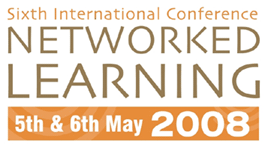

Patterns of students’ use of networked learning technologies
Maarten de Laat 1 and Gráinne Conole2
The University of Exeter1, The Open University 2 , M.F.DeLaat@exeter.ac.uk,
G.C.Conole@open.ac.uk
Abstract
The paper describes the findings from a study of students’ use
and experience of technologies undertaken as part of the JISC learner
experience programme (http://www.jisc.ac.uk/elp_learneroutcomes.html).
A series of in-depth case studies were carried out across four subject
disciplines, with data collected via survey, audio logs and interviews.
The paper will concentrate on the survey data, which consisted of a mixture
of qualitative and quantitative results. It will compare these findings
with related international surveys on students' use of technologies and
argue that taken together this wider body of evidence indicates that students
are immersed in a rich, technology-enhanced learning environment and that
they select and appropriate technologies to their own personal learning
needs.
The study focused on two main questions: How do learners engage with and
experience e-learning (perceptions, use and strategies) and how does e-learning
relate to and contribute to the whole learning experience? We delibarately
used a broad definition of e-learning ‘the use of any kind of internet
or communication service or electronic device that supports … a
learning activity’, to cover a wide range of technologies. To ensure
a wide range of student experiences data was collected with the support
of four HE Academy subject centres: Medicine, Dentistry and Veterinary
Medicine, Economics, Information and Computer Sciences, and Languages,
Linguistics and Area Studies. The participating institutions provided
a range of contexts across the UK – old and new institutions, city
and regionally based. The selection of students was done in close collaboration
with the participating subject centres. Learners who have been effective
in their participation with e-learning were approached to capture their
experience with e-learning. The methodological approach consisted of two
phases – a wider contextual review of the use of technologies across
a broad spectrum of students using an online survey and a more in-depth
series of individual case studies of technology use gathered through student
audio log diaries and interviews.
The presented findings of the survey show that higher education students
in the UK from various subject centres are well equipped when it comes
to using a wide range of technologies to support their learning activities
(computers, laptops, mobile phones, mp3 players, etc.). Besides using
the more traditional (dedicated) tools they also seem to find their way
to emerging web-based technologies (such as Web 2.0 tools) for communicating,
gathering and processing course related information with their teachers
as well as fellow students. Students are not only using a wide range of
tools they also vary (or seem to be flexible) in where they use them.
When asked about their places of study, students indicate studying at
home, university campus (including halls of residence) as well as their
workplace. This means that students are in general fairly flexible in
their use of different technologies as well as mobile in terms of where
they are able to use them. Our findings map to an international trend
toward higher levels of PC-ownership, coupled with increased ICT usage
and skills. Many are now arguing that these students fundamentally differ
from previous generations in the way they process information and communicate
(and hence learn). Terms such as: ‘digital natives’, ‘the
net generation’, ‘the Nintendo generation’, ‘the
neomillenial generation’ have been used to try and encapsulate this
shift. The characteristics of this new generation include the fact that
they are comfortable with technologies and adept at working in multiple/multi-modal
environments.
| About NLC |
2008 Conference Papers
| Conference Committee| Keynote
Speakers
| Papers from previous NL conferences |Research Seminars| Current Conference
| Sponsors | Contact
|
